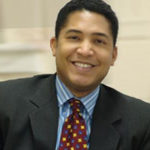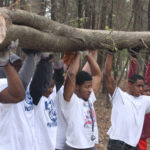WASHINGTON (RNS)—The U.S. Department of Defense announced a near doubling of its list of recognized religions. Now it formally will recognize humanism and other minority faiths among members of the armed forces.
The move, put into place at the end of March but made public in late April, means servicemen and women who are adherents of small faith groups now are guaranteed the same rights, privileges and protections granted to their peers who are members of larger faith groups.
The move was lauded by humanist organizations, which have been pushing 10 years for full recognition, including their own chaplains.
“Beyond humanism, the new listing is a win for diversity in general,” said Jason Torpy, president of the Military Association of Atheists and Freethinkers. “There have been prior declarations that the government or the military has recognized humanism in one way or another, but this is different.”
Humanism was recognized by the Army in 2014, but this new order expands that to all branches of the military.
Military now recognizes 221 faith groups
Previously, the U.S. military recognized just over 100 religions. The new list has grown to 221 to include the earth-based faiths, such as heathens and Asatru, and an additional eight Protestant groups, including the International Communion of the Charismatic Christian Church.
Jewish servicemen and women now may choose among Orthodox, Conservative and Reform instead of just “Jewish.”
Josh Heath, co-director of the Open Halls Project, which works to support heathens and other earth-based faiths in the military, said the newly recognized groups now will find it easier to get their holidays off, travel off-base to religious services or keep special religious items in the barracks.
Sign up for our weekly edition and get all our headlines in your inbox on Thursdays
“If you run into any miscommunication about your religious needs, you can say this is my official religious preference and be accommodated,” he said.
Heath hopes it will make it easier for military heathens to find each other and form on-base communities.
Provide more accurate accounting
Also, the Department of Defense will now have more accurate counts of each recognized religious group, which varies widely depending on who’s counting.
The Military Association of Atheists and Freethinkers asserts more than 22 percent of service personnel identify as “no religious preference,” and slightly more than 1 percent identify as “atheist” or “agnostic.” In 2010, the Defense Equal Opportunity Management Institute estimated humanists make up 3.6 percent of the U.S. military.
The new policy has its detractors. Writing for Reporter, the official newspaper of the Lutheran Church-Missouri Synod, Roger Drinnon said a “heavily secularized military culture, stemming from ongoing atheist activism and LGBT advocacy,” has led to “an environment where restrictions and even punitive actions reportedly are being imposed on chaplains, commanders and lower ranks who seek to serve without compromising their religious faith.”














We seek to connect God’s story and God’s people around the world. To learn more about God’s story, click here.
Send comments and feedback to Eric Black, our editor. For comments to be published, please specify “letter to the editor.” Maximum length for publication is 300 words.